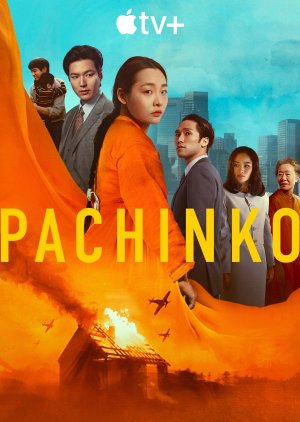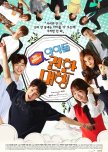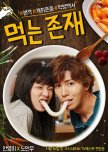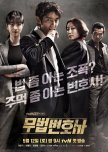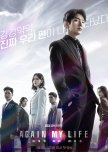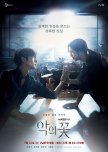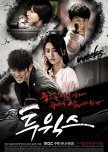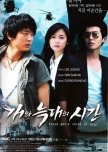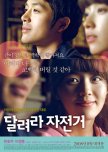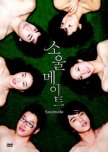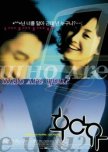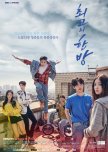
Emotional Packed With Perfect Portrayal
This is marvellousI like how every character got some story to tell it made it look like without one cast the story crumbles and weakens
Sadness,Desire,Love,Struggle Pachinko got all and more
LeeMinHo (Hansu) is giving Gangnam Blue vibe but more possessive And much more elegant and more aggressive
I like how he doesn't need too exaggerated portraying Hansu and still overshadows everyone around him
And I feel we will get more aggressive side of him later
Sunja and Hansu are intense
Was this review helpful to you?

This review may contain spoilers
The Struggles of a Thriving Immigrant Family Continues in Foreign Land
The ongoing struggles of a thriving korean immigrant family continue to unfold in foreign lands. This poignant story picks up seven years after the events of Season 1, diving deeper into themes of racism, identity and the painful ways individuals begin to reject their own heritage in order to fit into society.This season’s heart is Noa's story. Once a gentle, hopeful child, we watch as the harsh realities of his surroundings shape his future. The haunting shadows of the past never leave this family and ultimately, the painful truths from their history come back to ruin everything.
This season also intricately explores the lives of other characters with great depth. Gyeonghui and Changho’s forbidden love, Yoseb’s harrowing PTSD after the war, Gyeonghui’s sacrifice of her love, Han Su’s obsessive ambitions for his son and Solomon’s battle to belong in japanese society as a korean, each of these stories runs parallel, weaving together to make this show feel complete. Each story presents its own unique struggles and perspectives.
The entire ensemble cast delivered marvelous performances, with several scenes leaving a lasting impact on me. The confrontation between Han Su and Noa in the last episode was powerful and Noa’s farewell to his mother, Sunja, was utterly heartbreaking. This scene was even more painful if you know how things unfold in Book 3.
Every time i see the older Sunja, the actress's eyes seem to tell the story of her past struggles. Even after losing so many loved ones, she carries on for the sake of her remaining family. The emotions she conveys are extraordinary and Youn Yuh Jung's portrayal is a masterclass in acting. Its no wonder she is an Oscar winner, her performance makes that clear.
Lee Minho who had never particularly impressed me before, truly shone in Pachinko. In Season 1, i especially liked his performance during the Great Kanto Earthquake of 1923 scene, where he was outstanding. In Season 2, i was most impressed by his confrontation with Noa where his micro expressions were spoton after Noa left his house.
Kim Minha delivered a brilliant portrayal of the mother of two teenagers. Not once did i feel she was too young for the role. The fact that Kang Taeju, who plays the adult Noa, is only four months older than her in real life surprised me the most!!
This season covers the events from Book 2 and i cant wait for the next season, which will delve into Book 3.
Was this review helpful to you?
They tried.
I liked this installment somewhat better than the first, which came across as being an effort to rewrite the novel with an anti-Japanese slant. I still rate the book far better than this adaptation. The main thing that bothered me was the labored Japanese accents, including the Osaka dialect even with the native Japanese actors. But that probably doesn't bother anyone who doesn't know the language. The Osaka dialect is apparently very difficult to reproduce because I have never heard non-Osaka born actors in Japan get it quite right. My Korean grandfather spoke it perfectly, having lived in the Kyoto/Osaka area since he was 13 years old. I never heard any of the Japanese Koreans speak with such thick accents. Not only were they forced to change their names, they were also not allowed to speak Korean during the occupation, so I think they were compelled to become quite proficient in Japanese. They worked very hard to blend in and not let it be known who they were. In fact I often didn't know they were Korean for years until someone told me. So the speech of the characters in this adaptation doesn't quite ring true to me. I wish the actors had been provided with more dialect coaching. But it is what it is. It's not like it's uncommon for Korean dramas to foist atrocious accents on their audience and assume no one will notice. I still appreciate that an effort was at least made to tell this very little known part of history.Was this review helpful to you?

Top notch acting by everyone
Sunja’s struggle to find a sense of belonging, both as a woman and as a Korean immigrant in Japan, becomes even more poignant as her family’s legacy unravels. Her journey across different timelines is seamlessly portrayed, blending past and present in ways that enrich the story’s emotional depth.Noa Baek’s ending is a powerful and tragic conclusion to a character who embodied the show’s central themes of identity, sacrifice, and survival. It highlights the painful complexities of living between cultures and the emotional toll it can take on individuals and families.
On the other hand, Solomon’s continued conflict with his identity as a Korean-Japanese businessman in modern Japan highlights the intergenerational tension and the persistent struggle with systemic discrimination which was a bit confusing.
Was this review helpful to you?
This review may contain spoilers
Bittersweet! But 10/10
I didn’t realize we had to wait two years for season 2, and even though the wait was long, it was totally worth it! I was left with questions and wanting more, which honestly isn’t a bad thing.Let me just say, brace yourselves—episode 2 broke me! I was crying like a baby. The cast, as always, was top-notch; everyone understood the assignment. Even the young actors, like young Mozazo, had me laughing all the time. And Mr. Kim (Kim Sung Kyu)—oh my gosh, he is incredible! His eyes alone convey so much anguish, love, pain—everything.
The way the storyline weaves between the past and present was done so magnificently that it’s impossible to get lost or confused. However, I will admit, Solomon’s plan and his entourage had me a bit confused at times.
Throughout the show, no one pissed me off more than Gyeong Hui. Like, sis, LIVE YOUR LIFE, LOVE WHO YOU WANT TO LOVE. But I understand her character was a reflection of how many women from that era depended on their husbands’ permission for everything—even to get groceries. I think that’s one reason she never followed her love for Mr. Kim. His love could’ve been her liberation, but she couldn’t take that step.
Now, please don’t hate me for this, but Ko Han Su really came through in the end. I don’t condone his behavior toward Sunja, but I think he’s already paid for his sins, at least when it comes to his wrongdoings toward her. Bringing her mother was such a big moment. To me, it was like saying, “I know you didn’t want to leave your homeland, and I know it broke you to leave your mother—but you had to, because of me. So, I’m going to find her and bring her to you.”
I really hope Lee Min Jin and Soo Hugh continue working together because wow!
Was this review helpful to you?
Love it.
Love everything, and also reading the book helps see and feel everything in the story. Is a masterpiece, real life story. It's not a typical kdrama, fantasy and ceo love story, is a mature side of life. All cast is acting fantastic. I feel that Hansu loved Sunja in his own way. And also her heart was all for Isak but also for Hansu, with respect for each of them. 💛Was this review helpful to you?

This review may contain spoilers
Emotional rollercoaster ride
I cried in ending. It was emotional from 1st episode but last episode made me cry.*spoiler begins*
I thought Noa is dead. It was Illegal cliffhanger. Director should have killed him here in this episode. So I could get over his death before 3rd season. I am not that excited about 3rd season. Knowing that he is going to die.
*Spoiler ends*
I watched first season because of Lee MinHo. So I was not into story that much. But 2nd season story had my full attention.
My 1st review on mdl:
Story: emotional rollercoaster ride. I am not going to spoil the drama. Go watch if you want to know the story. If you are novel fan then you should definitely watch it. If you are fan of any actors then it's must watch. But if you are LMH fan. He is not playing his usual romantic character. Watch it with caution. Warning He is playing a cheater character here. But if you are his antifan who doesn't like his acting. Then this drama is for you. Because if you don't like his acting here. Then you definitely have bad acting sense.
Acting/cast:
Sunja: tragic fated beautiful heroine from classical novel.
Min ha: She is good actress. I have seen her in their promotional yt videos. She is cheerful person.
Youn Yuh Jung: She deserve Best actress award. While Minha was doing all those suffering scene. But Yuh Jung made me believe with her acting she is the one who had survived all those suffering. And deserve happy ending.
Koh Hansu: Grey manipulative man who perfectly fit Wattpad Alpha ML character. I can say he is the only relatable character in pachinko.
Controlling father. Power lover. A possessive man. Who doesn't want to let go what he own or believe that he own-sunja. Who want control over his family, his daughter. He thinks he is right. And can't accept he could be wrong. He actually took advantage of Sunja. But he believes they were in love.
Lee MinHo: no one could fit this character better than Lee MinHo. Only Lee MinHo has power to make us fall with his manipulation/acting/toxic character.
Solomon: I read he is not that much important character in novel. But here he is as much important as Sunja. Who has inherited his surviving instict from Sunja. And I want happy ending for him.
Jin ha: love his fashion sense. Definitely a good actor.
Special mention to all Child actors. Child actor have the power to make any scene as tragic as possible. And many important character whose name I forgot. Mozasu, Noa's teacher, Solomon's ex, Koh Hansu's wife and daughter who doesn't have face, etc. You all are such an amazing character.
Music:
As a blink. One of best song from Rose 'Viva la vida'. I listened it in loop. I am obsessed with this song and her voice.
One more drama intro I never skipped. It was the only brightest scene in whole black dark drama.
Rewatch value:
Because I am definitely going to rewatch this season again. Before start of 2nd season I had rewatched 1st season. And it helped me understand many small details which I missed in my first watch.
So I know I will watch 1st and 2nd season again when 3rd season is released.
Overall: I am glad my most important problem is Exam and not surviving war.
This is Lee MinHo Hollywood debut. It is not kdrama. And it doesn't give kdrama vibe at all. If you enjoy art, history. Give this drama a try. I hope you enjoy it as much as I enjoyed. Bye!
Was this review helpful to you?

Stellar performances and great storytelling
I must say: What a cast! All the main actors are delivering stellar performances. Combined with the great cinematography, fitting music, and a solid script, this is a quality production resulting in very good storytelling. It evokes emotions, builds bonds with the characters, makes you curious about the historical background events …The only think I struggle a little bit with is the jumping between decades - especially in the first few episodes when I hadn’t refreshed my memory good enough about the different characters.
Having read the book some years ago, I do have some recollections about events, so I am really hoping for at least one more season. I am not sure I would have enjoyed this as much as I do if I hadn’t read the book, though.
It is a bit slow, so it might not be for everyone, but for me the overall quality throughout everything outweighs this.
As for the cast:
Youn Yuh Jung as old Sunja is blowing my mind; the depth of her portrayal for this petite, rather frail looking old woman is so strong.
Kim Min Ha as adult Sunja delivers a consistent convincing performance. There’s just a few instances where she looks a bit too young, but that’s not down to her acting skills.
As for Lee Min Ho as Koh Hansu - I think this must be the best role I have seen him in. I have not been a superfan of his before (more like «he’s OK»), but here his acting skills really comes to light. Hansu is a complex, interesting character, and Lee Min Ho nails the portrayal.
Was this review helpful to you?

Good Enough
'' Panchinko 2 '' is the second season of the multigenerational drama based on the book of the same title.This time around, as the story has settled, it's easier to follow the characters and to understand the time jumps and the narratives.
Also, in this season, the drama focuses even more on the family dynamics and gets more melodramatic, with plenty of emotional and devastating scenes.
The performances were, just like in the first season, pretty great by everyone.
So, overall, seven out of ten.
Was this review helpful to you?

Pachinko Season 2 is a visually stunning
The second season of Pachinko continues the emotional depth and narrative complexity of the first season, building on the intergenerational saga that spans Korean and Japanese histories. Based on Min Jin Lee's novel, Pachinko explores themes of identity, resilience, and family, all set against the backdrop of war, migration, and discrimination.The second season delves deeper into the personal stories of the Baek family across different time periods. Sunja's journey as a young woman struggling to survive in occupied Korea continues to take center stage, while her descendants in later years deal with issues of belonging and cultural identity in Japan. Lee Min-ho reprises his role as Hansu, whose complex relationship with Sunja adds layers of emotional tension.
The show does a beautiful job of weaving together the historical struggles of Koreans living in Japan and their fight for recognition and dignity. In the second season, there is a greater emphasis on the economic and social challenges they face as immigrants, giving a more nuanced portrayal of life under Japanese rule and the subsequent generational trauma.
Visually, Pachinko 2 remains stunning. The cinematography captures both the beauty and harshness of the world these characters inhabit. From the sprawling rural landscapes of early 20th-century Korea to the urban life in post-war Japan, the contrast in visuals emphasizes the passage of time and the evolution of the characters' lives.
The use of color is particularly effective in conveying mood and emotion—warm tones for moments of hope and connection, and colder tones for scenes of hardship. The period-accurate sets and costumes further enhance the immersion in the various time periods.
The performances in Pachinko Season 2 are even more powerful, with Youn Yuh-jung returning as the elder Sunja, delivering a heart-wrenching portrayal of a woman reflecting on her life, losses, and sacrifices. The younger Sunja, portrayed by Kim Min-ha, continues to impress with her raw vulnerability and determination.
Lee Min-ho as Hansu brings more complexity to his morally ambiguous character, whose choices are shaped by both love and survival instincts. The supporting cast, including Jin Ha as Solomon, also shines, with his storyline reflecting modern-day issues of corporate life, identity, and familial obligation.
Season 2 deepens the exploration of themes like survival, displacement, and the ripple effects of historical trauma. The multi-generational structure of the series allows for a rich examination of how the experiences of the older generation shape the lives and choices of their descendants.
The emotional weight of the series is significant, but it is balanced by moments of tenderness and hope. The relationships between the characters, particularly within the family, are portrayed with warmth and complexity.
One of the challenges of Pachinko 2 is its non-linear storytelling, which can be difficult to follow for some viewers. The frequent shifts in time periods require attention to detail, but for those who appreciate intricate narratives, this structure allows for a deeper connection to the characters’ experiences over time.
Overall, Pachinko Season 2 is a visually stunning, emotionally rich continuation of the Baek family’s saga. Its exploration of Korean and Japanese history, coupled with its deep character studies, makes it a profound and moving drama. Fans of the first season will find much to love in the second, as the series continues to be a masterclass in storytelling, offering a rare and deeply human look at the intersections of culture, identity, and history.
Was this review helpful to you?
Perfect in all categories
What an amazing drama. Not what I have seen for the past few years. I followed the 2 time lines smoothly, and able to feel pain of different generations. Lee Min Ho slayed his role as Koh Hansu, I loved and hated Koh Hansu at the same time. But I always love Lee Min Ho. Jinha and Kim Minha and young actors are so so good as well. A must watch drama for this year.Was this review helpful to you?
Life is a struggle I get it!
I watched Pachinko 2 first episode. I feel how people struggle those days in order to live, involving in making and selling illegal wine, family violence, dirty and unhygienic living environment, experiencing so much pain, fear , humiliation, frustration… it is really sad, mad and bad that I gained. BUT it is an eye opener for me! The story was so truly told, and I can’t but to praise the whole Pachinko2 team, from all level of the production. I am amazed by Lee Min Ho’s acting, his suppressed anger was so subtly expressed. Wow, the best Kactor.Was this review helpful to you?

